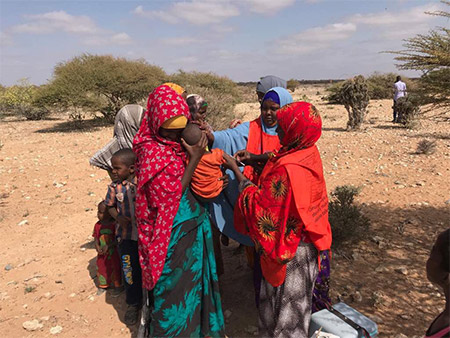 WHO and partners support development of Somali reproductive, maternal, neonatal, child and adolescent health strategyMogadishu, 24 January 2019 - With support from the World Health Organization (WHO) and other United Nations partners, Somalia is currently developing a strategy that will change the rhetoric in the country and ensure Somali mothers and children can access quality health services equitably all across urban, rural areas in the country. Known as the “Reproductive, maternal, neonatal, child and adolescent health strategic plan” for Somalia, it focuses on using universal health coverage – a concept that ensures health is equitably delivered to all, without beneficiaries suffering financial hardships while accessing health – as a key tool to availing lifesaving health services to Somalis in urban and rural areas, as well as those with nomadic lifestyles.
WHO and partners support development of Somali reproductive, maternal, neonatal, child and adolescent health strategyMogadishu, 24 January 2019 - With support from the World Health Organization (WHO) and other United Nations partners, Somalia is currently developing a strategy that will change the rhetoric in the country and ensure Somali mothers and children can access quality health services equitably all across urban, rural areas in the country. Known as the “Reproductive, maternal, neonatal, child and adolescent health strategic plan” for Somalia, it focuses on using universal health coverage – a concept that ensures health is equitably delivered to all, without beneficiaries suffering financial hardships while accessing health – as a key tool to availing lifesaving health services to Somalis in urban and rural areas, as well as those with nomadic lifestyles.
Somali mothers and children have been enduring limited access to some of the most basic health services for decades. This has translated in scores of families losing their loved ones to preventable diseases every year. One out of every 12 women dies due to pregnancy-related causes, mostly due to ineffective antenatal care, child deliveries conducted in the absence of skilled birth attendants, late management of complications, such as bleeding, and difficulty in accessing health facilities, particularly for rural populations.
Statistics for children are just as disturbing, with one out of every 7 Somali children dying before seeing their fifth birthday. Leading causes of infant and child mortality are pneumonia, diarrhoea, measles and neonatal disorders.
At a consultative meeting in Mogadishu last week, where partners discussed this critical strategic plan, the Somali Federal Government Minister of Health HE Dr Fawziya Abikar Nur emphasized the importance of health and other key partners in rolling out activities outlined in the plan.
“This groundbreaking strategy will make much-needed contributions in reducing
reproductive, maternal, newborn and child mortality and morbidity in Somalia,” said Dr Ghulam Popal, the WHO Somalia Country Representative. “One key element, for example, will be training for health staff, in areas such as lifesaving resuscitation of newborns, and to deliver children professionally.”
Basic and comprehensive lifesaving services that will be offered through the strategy include safe blood transfusions and caesarean section deliveries for women delivering babies at both community and health facility levels. The strategy will also promote continued care across pregnancy and early childhood, as well as the effective referral during pregnancy and childbirth. Care for newborns will entail the provision of medical supplies and equipment; and monitoring of the low birth weight of pre-term infants. The use of integrated management of childhood illnesses (IMCI) – an integrated and holistic approach to child health that focuses on the wellbeing of the child – will promote comprehensive childcare, using new developments and protocol.


